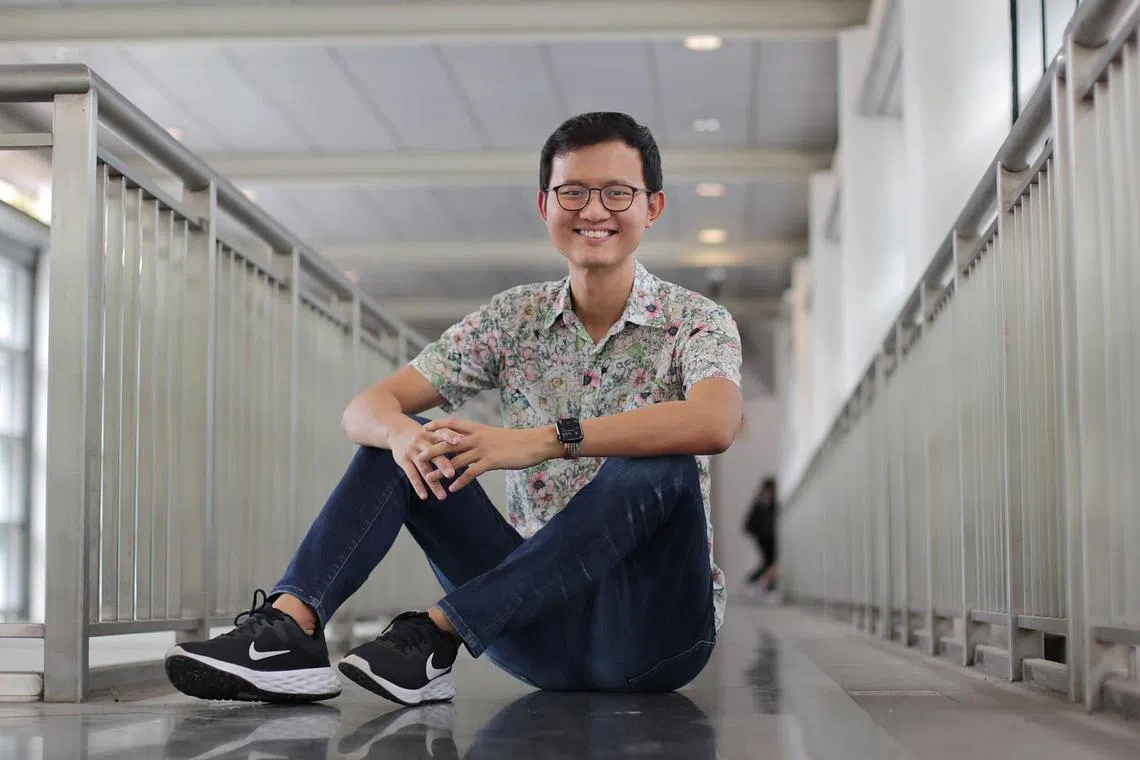Consumers taking up DNA tests to learn about their genetic risks
Sign up now: Get ST's newsletters delivered to your inbox

Mr Joel Kek decided to cut down on his alcohol intake after a commercial DNA test result.
ST PHOTO: GIN TAY
SINGAPORE - Sabrina, who is 23, undertook clinical DNA testing after showing symptoms of amyotrophic lateral sclerosis (ALS), also known as Lou Gehrig’s disease.
ALS is a progressive neurological disease that results in the death of motor neurons – nerve cells that control the muscle.
It progressively affects a person’s ability to move, speak, eat and breathe unassisted, often leading to death from respiratory failure. There is currently no effective cure for the disease.
Physicist Stephen Hawking, who died in 2018 at the age of 76, was diagnosed with the disease at 21. The average age that patients present symptoms is 55 years old.
Sabrina was diagnosed with ALS via clinical genetic testing in January 2023, after her neurologist called in a genetic doctor when she started exhibiting symptoms.
She said she was shocked, but also grateful and relieved by the findings.
“I was shocked because there is no family history of ALS, but relieved because I finally knew the reason behind my sudden weakness,” she said. She declined to provide her full name as she has not informed all her relatives of her condition.
With the diagnosis, Sabrina has now started early treatment – something possible only due to the genetic test.
While a typical ALS diagnosis requires multiple tests and a lengthy process of elimination to rule out other diseases, the genetic test confirmed her neurologist’s suspicions instantly, saving her precious time.
Sabrina said she was told her test also helped link a previously unknown genetic mutation to ALS, making future ALS genetic diagnosis easier for others.
Genetic ALS, which accounts for 10 per cent of cases, also has treatments in the pipeline. Sabrina has opted for two out of the three approved treatments.
Mr Joel Kek, 31, was motivated by the results of a non-clinical DNA test offered by direct-to-consumer (DTC) genetic test provider 23andMe to cut down on his alcohol intake.
“I found out that I have higher odds of developing liver diseases,” he said.
“It’s just the way my body processes alcohol. It’s more damaging than typical, and that sounded pretty scary, so I decided to cut down on my intake.”
DTC tests do not require a doctor’s referral, unlike clinical DNA testing.
Mr Kek, the co-founder of Mito Health, a healthtech start-up based in Singapore, said he was motivated mainly by curiosity to take the test. It cost $199.
“Ultimately, I feel like knowledge is power. I operate my body day to day, but there’s so much I don’t know about how it functions,” he said.
“I can send my money over, do a saliva test, and they’ll tell me about my DNA and give me more insight into how my body works.”
Mr Kek also said that he wished the results from DNA testing could be entered into the healthcare system for doctors to reference.
“For example, I found out that I have an increased risk of myopathy, a disorder that causes muscle pain and damage, if I use statins, a type of cholesterol medication,” he said.
Mr Kek added that he is aware the result does not mean that statins are definitely going to be really bad for him.
“But on the population-level, people who did have this gene, who took statins, had about 20 times higher risk of developing myopathy. It’s a kind of correlation,” he said.
Although observers have flagged concerns over the commercialisation of DNA information by DTC providers, Mr Kek said he is comfortable with 23andMe’s privacy policy regarding the use of his genetic data for research and development.
“They’re transparent about it,” he said. “I think, as long as it’s not identifiable, and I’m furthering some medical cause, I’m comfortable with that.”
Following her diagnosis, Sabrina started spending more time with her friends and family. She makes it a point not to worry too much about her condition, as it is impossible to predict when she will start losing the ability to eat or swallow.
She also tries to remain healthy by sleeping early and drinking plenty of water.
Asked for her thoughts on genetic tests, Sabrina said: “It really depends on the individual.
“My doctor mentioned that while it might be useful, since the individual would be aware of their predisposition to an illness, it would lead to some individuals living in fear instead.”
Her family members were offered tests by her genetic doctor as well. They turned down the offer as they believed that having the same genetic mutation does not equate to having the disease.
If there were indeed a match in genes, they would live a life of fear despite showing no symptoms.
“And that isn’t a great way to be living your life, since a higher chance of having it does not mean that you will definitely have it. So, I think it really depends on each individual,” Sabrina said.
“Either way, we should strive to live our best lives regardless of our genetic predisposition.”


